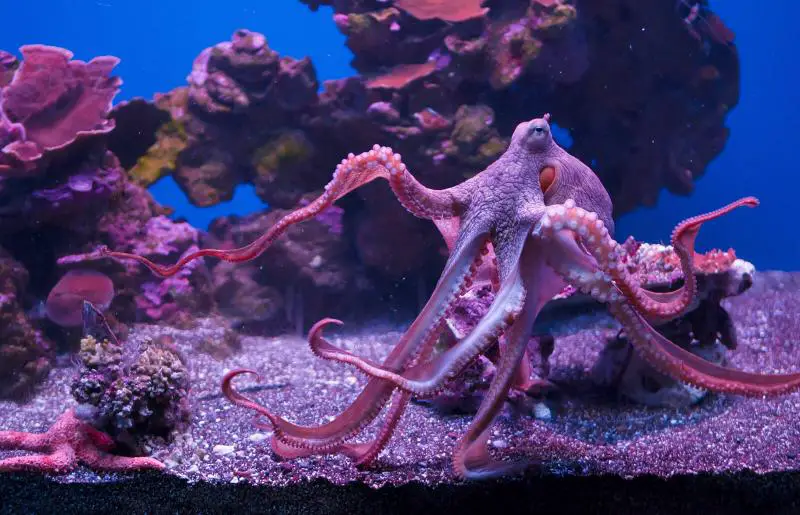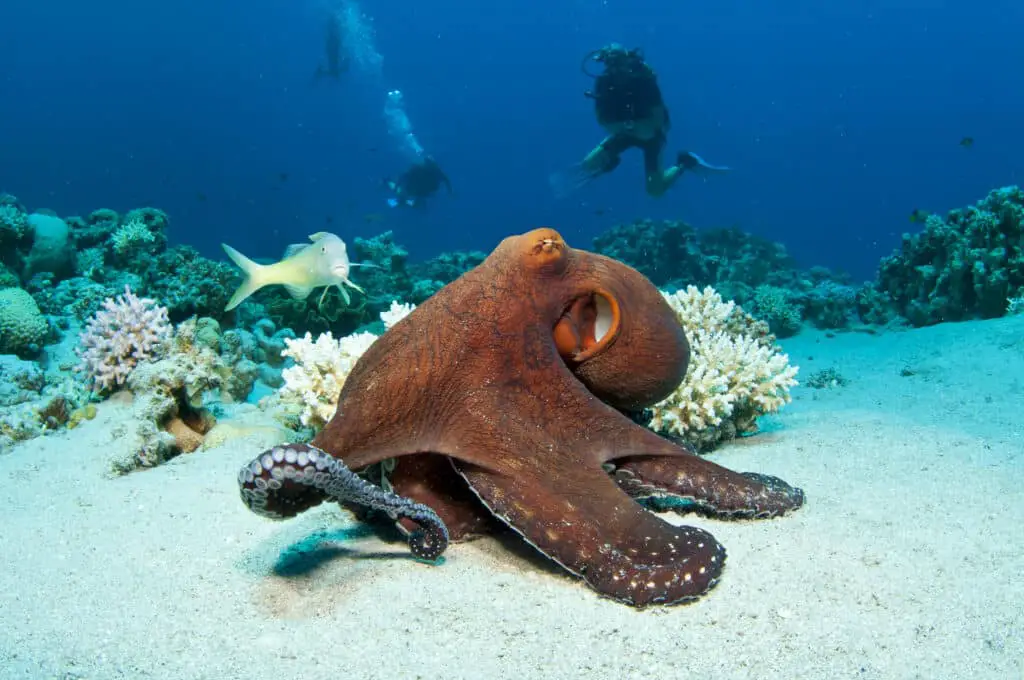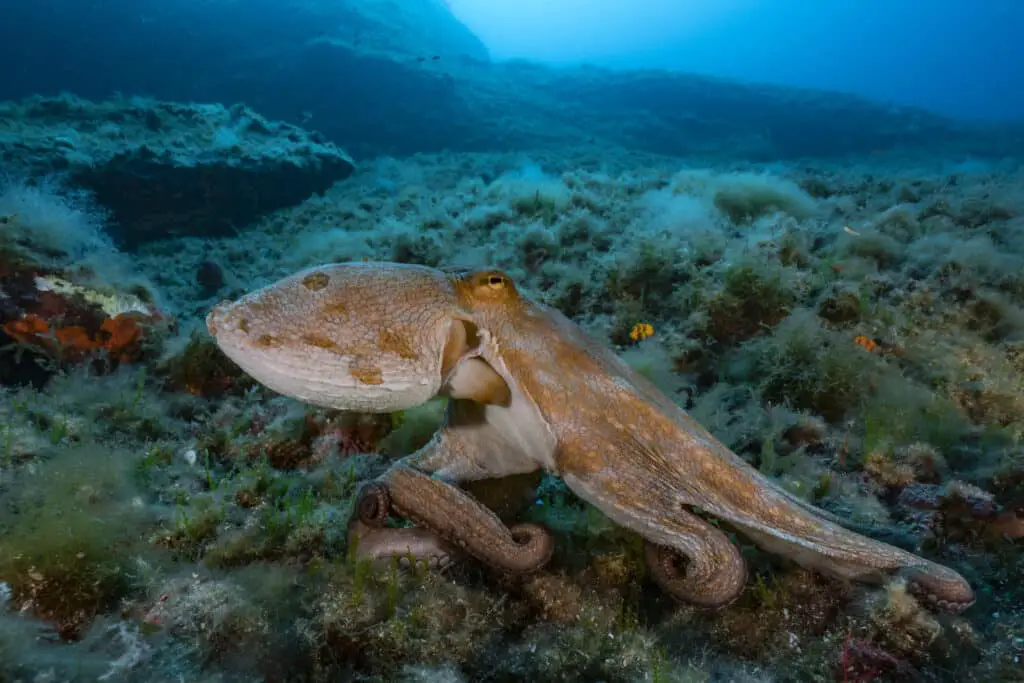Are Octopuses Fish

Introduction
Are Octopuses Fish: At first glance, it’s easy to assume that octopuses belong to the same category as fish, especially due to their aquatic octopuses habitat. However, a closer examination reveals that they are, in fact, remarkably different.
Octopuses are marine creatures belonging to the class Cephalopoda, a group that includes squids and cuttlefish. This class is part of the phylum Mollusca, which also encompasses snails and clams. Fish, on the other hand, are vertebrates and belong to the phylum Chordata. This fundamental distinction sets octopuses apart from fish.
One of the most striking differences is in their body structure. Octopuses lack the characteristic backbone or spine found in fish. Instead, they have a soft body with a complex nervous system and three hearts, making them vastly different from the bony or cartilaginous fish we typically think of. Octopuses also possess an incredible ability to change the color and texture of their skin, a feature not shared by fish.
Octopuses exhibit remarkable intelligence and problem-solving abilities, which are not characteristics associated with fish. These cognitive abilities have fascinated scientists and led to studies exploring their unique behaviors.

Is A octopus a type of fish or a squid?
In summary, if you see a sea creature with eight sucker-covered arms and a round shape, that’s an octopus. But if it’s got a long, thin, triangular shape and 10 limbs—eight arms and two tentacles—it’s a squid.
An octopus is neither a type of fish nor a squid. Octopuses, squids, and fish are all distinct creatures with their own unique biological classifications. Octopuses belong to the class Cephalopoda within the phylum Mollusca, making them mollusks. They are characterized by their soft, boneless bodies, multiple arms, and incredible intelligence.
On the other hand, squids are also cephalopods, closely related to octopuses. They share characteristics like a soft body, a beak-like mouth, and tentacles adorned with suction cups. However, they have elongated bodies and a long, flexible internal shell called a pen.
Fish, in contrast, belong to the phylum Chordata, making them vertebrates. They have a backbone, gills for breathing, and typically fins for locomotion. Fish encompass an incredibly diverse group of aquatic animals, from bony fish like salmon and trout to cartilaginous fish like sharks and rays.
While octopuses and squids are related within the same class, they are not types of fish. Each of these creatures occupies a unique place in the natural world, showcasing the rich tapestry of biodiversity found in our oceans.
Is A octopus a Reptile?
What are octopuses? Octopuses (or octopi, if you prefer) are cephalopods, invertebrates that also include squid and cuttlefish.
No, an octopus is not a reptile. Octopuses and reptiles are vastly different in terms of their biological classification and characteristics.
Octopuses belong to the class Cephalopoda within the phylum Mollusca. They are marine invertebrates known for their soft, boneless bodies and the presence of multiple arms. Octopuses are members of the mollusk family, which also includes creatures like snails and clams. They are not vertebrates, and they lack the characteristics typically associated with reptiles, such as scales, a backbone, and the ability to regulate their body temperature.
Reptiles, on the other hand, belong to the class Reptilia. They are vertebrates characterized by their scaly skin, internal fertilization, and the ability to lay amniotic eggs. Reptiles encompass a wide range of animals, including snakes, lizards, turtles, and crocodiles. Unlike octopuses, reptiles are cold-blooded, meaning they rely on external sources to regulate their body temperature.
Octopuses and reptiles are distinct branches of the animal kingdom, with octopuses falling under the phylum Mollusca and reptiles under the class Reptilia. Their differences in anatomy, reproduction, and physiology make it clear that octopuses are not reptiles.
Is octopus called Devil Fish?
The correct answer is Octopus. Key Points. Octopus is also called devilfish. Octopus is also known as devilfish due to the appearance of eight muscular arms or tentacles. The devilfish or giant devil ray is a species of ray in the family Mobulidae.
The term “Devil Fish” may have originated from the octopus’s unconventional appearance, with its soft, bulbous body, numerous writhing arms, and large, intelligent-looking eyes. In certain cultures and historical contexts, people may have associated these features with something otherworldly or sinister.
Octopuses also have a reputation for their remarkable adaptability and intelligence. They are known for their problem-solving abilities, complex hunting strategies, and their ability to change color and texture, which adds to their mystique. This intelligence and adaptability might have contributed to the “Devil Fish” moniker as well, as it can make them seem cunning or even otherworldly.
It’s important to note that the term “Devil Fish” is not a scientific or formal name for octopuses. In the scientific community, they are classified under the class Cephalopoda within the phylum Mollusca. Nevertheless, the nickname adds a touch of intrigue and fascination to these incredible marine creatures, reminding us of the many wonders of the natural world.
Is a squid a fish?
Squid are not fish. They are classified as cephalopods, which are specific members of the Mollusca phylum. Squid belongs to the Teuthida order.
Squids and fish are distinct creatures with significant differences in terms of their biology, classification, and characteristics.
Squids belong to the class Cephalopoda, which is a group of marine invertebrates. They are closely related to octopuses and cuttlefish and are characterized by their soft, elongated bodies, numerous arms adorned with suction cups, and a beak-like mouth. Unlike fish, squids do not have scales, fins, or a backbone. Instead, they have a flexible internal structure called a pen.
Fish, on the other hand, belong to the phylum Chordata and are vertebrates. They have a backbone (vertebral column), gills for breathing, and typically fins for locomotion. Fish exhibit a wide range of diversity, from bony fish like salmon and trout to cartilaginous fish like sharks and rays.
Is a giant octopus a fish?
The Giant Pacific Octopus is in the mollusk Phylum Mollusca including snails, clams, chitons; and the Class, Cephalopoda including squid, cuttlefish and nautilus. There are at eight species of octopus found in Alaskan waters; the Giant Pacific Octopus is most common.
Despite both being marine creatures, octopuses belong to a completely different biological group than fish. Octopuses are part of the class Cephalopoda, which also includes animals like squids and cuttlefish. These creatures are mollusks, which means they are related to snails, clams, and slugs. Octopuses are known for their soft bodies, bilateral symmetry, and the presence of eight long, flexible arms lined with suckers.
In contrast, fish belong to the class Osteichthyes or Chondrichthyes, depending on their bony or cartilaginous skeletal structure. Fish are vertebrates with backbones, gills for breathing, and fins for locomotion. They have a streamlined body shape that allows them to move efficiently through water.
Giant octopuses, such as the Giant Pacific Octopus (Enteroctopus dofleini), are remarkable cephalopods and are among the largest and most intelligent invertebrates in the ocean. Their distinct features and classification place them firmly in the category of mollusks, not fish. So, while they both inhabit the ocean, octopuses and fish are separate and distinct groups within the animal kingdom.
Why is it important to distinguish between octopuses and fish?
Distinguishing between octopuses and fish is crucial for several reasons, primarily rooted in science, conservation, and our understanding of the natural world:
- Scientific Accuracy: Scientifically classifying and categorizing organisms accurately is fundamental to the field of biology. It helps researchers study and understand the unique characteristics, behaviors, and evolutionary histories of different species.
- Ecological Research: Understanding the roles that different species play in ecosystems is vital for ecological research. Octopuses and fish occupy distinct niches within aquatic environments, and their interactions with other species, including prey and predators, are different. Accurate identification allows scientists to study these interactions more effectively.
- Conservation: Conservation efforts rely on accurate species identification to protect vulnerable or endangered species. Misidentifying octopuses as fish could lead to inadequate conservation measures, potentially putting octopus populations at risk.
- Education and Awareness: Accurate biological knowledge is essential for educating the public and raising awareness about the diversity of life on Earth. Teaching people the differences between octopuses and fish fosters a deeper appreciation for the natural world.
- Sustainable Fisheries Management: Proper species identification is crucial for fisheries management. Fisheries must accurately identify target species to ensure sustainable practices and avoid overfishing, which can have detrimental effects on marine ecosystems.
Can octopuses breathe underwater like fish?
Octopuses do not breathe underwater like fish. While both octopuses and fish are aquatic creatures, they employ fundamentally different mechanisms for obtaining oxygen from the water.
Fish are equipped with gills, specialized respiratory organs that extract oxygen dissolved in water. They actively draw water over their gills by swimming or by using a specialized pump in their mouth, allowing oxygen exchange to occur. This adaptation enables fish to extract oxygen from the water and respire efficiently underwater.
In contrast, octopuses are not equipped with gills. Instead, they rely on a unique respiratory system that involves extracting oxygen from the air. Octopuses have specialized structures called branchial hearts that pump oxygenated blood to their tissues, and they obtain oxygen by drawing water into their mantle cavity and over their gills, which are highly modified structures compared to those of fish.
So, while octopuses are adapted for underwater life, they do not “breathe” underwater in the same way fish do. Their reliance on atmospheric oxygen sets them apart from fish in terms of their respiratory biology.
Are octopus a fish?
An octopus is neither a fish nor a mammal. Instead, octopuses are cephalopods related to squid and cuttlefish. The octopus is classified as one branch of mollusks.
Octopuses are not fish. Octopuses belong to a distinct branch of the animal kingdom compared to fish, and they are classified as mollusks. Octopuses are members of the class Cephalopoda within the phylum Mollusca.
They are marine invertebrates characterized by their soft, boneless bodies, multiple arms (usually eight), and highly developed intelligence. Octopuses are known for their complex behaviors, problem-solving abilities, and remarkable adaptability to their aquatic environments. They are also capable of changing the color and texture of their skin for camouflage and communication.
Fish belong to a different phylum altogether, called Chordata. Fish are vertebrates, meaning they have a backbone (vertebral column) and internal skeletons. They typically possess gills for respiration, scales covering their bodies, and fins for locomotion in water. Fish encompass a vast and diverse group of aquatic animals, ranging from bony fish like trout and tuna to cartilaginous fish like sharks and rays.
While octopuses and fish share the same aquatic habitat, they are biologically distinct and belong to separate taxonomic classifications. Recognizing these differences enhances our understanding of the incredible diversity of life in the oceans.

Conclusion
The intricacies of biological classification and the remarkable diversity of life in our oceans. We’ve uncovered a definitive answer: octopuses are not fish. Instead, they belong to the class Cephalopoda within the phylum Mollusca, while fish are vertebrates classified under the phylum Chordata.
This distinction goes beyond mere categorization; it highlights the extraordinary adaptability of life forms in aquatic environments. Octopuses have evolved in ways that are distinct from fish, from their soft, boneless bodies to their unique abilities such as color-changing camouflage and problem-solving intelligence. These features make them one of the most enigmatic and captivating creatures in the ocean.
Understanding these differences not only enriches our knowledge of marine life but also underscores the importance of biodiversity and conservation. Both octopuses and fish play vital roles in the complex web of ocean ecosystems, and preserving their habitats is essential for the well-being of our planet.
So, while octopuses and fish share the same watery realm, they are fundamentally different organisms with their own unique stories to tell. Exploring these distinctions not only deepens our appreciation for the wonders of the sea but also reminds us of the incredible diversity of life on Earth, each species contributing to the intricate tapestry of our natural world.



